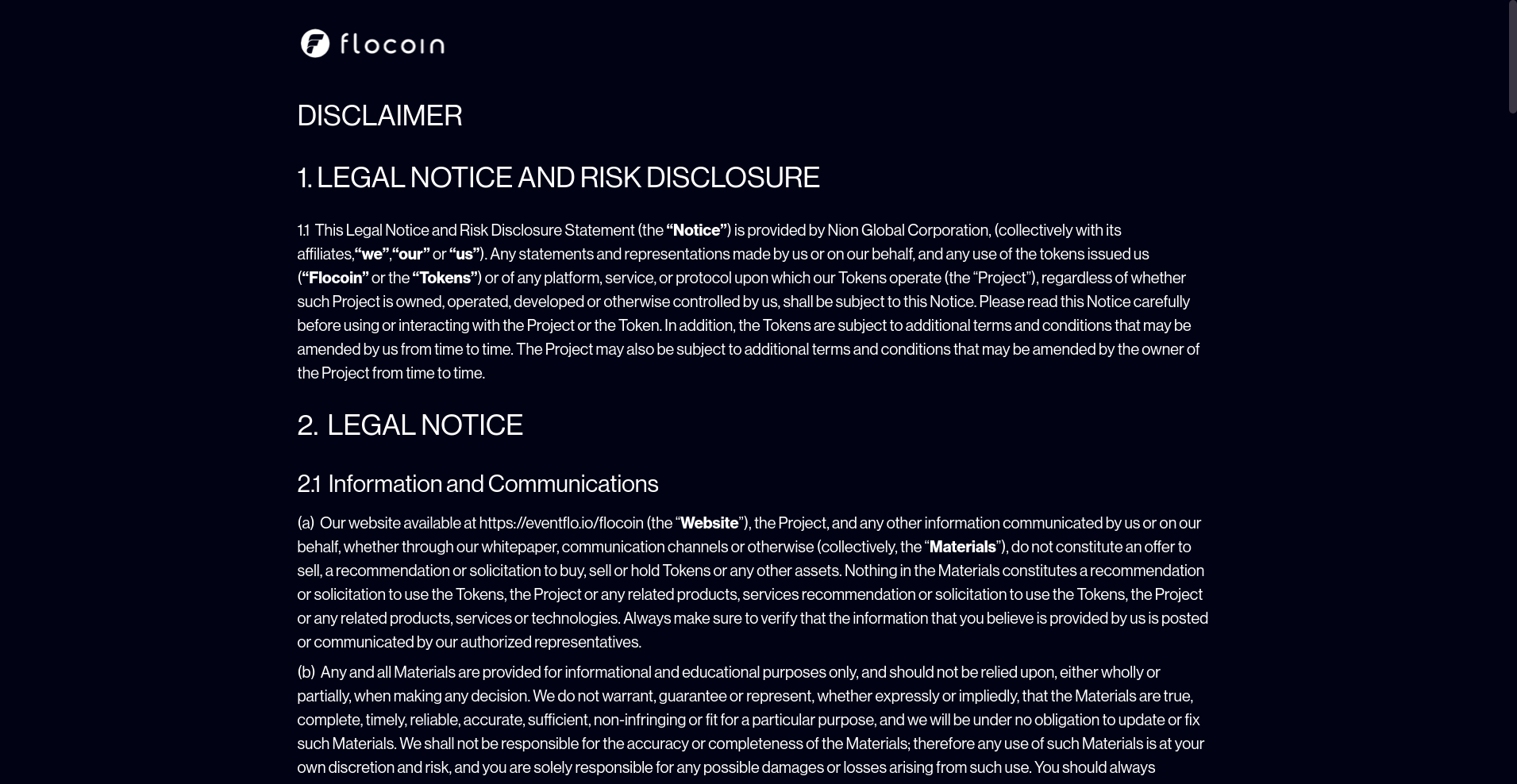eventflo Review: Scam or Legit Crypto? Uncovering All The Red Flags

What Exactly Is eventflo?
eventflo presents itself as an innovative platform that aims to revolutionize the event industry by combining blockchain technology and artificial intelligence. The project promises a seamless, transparent, and fraud-proof ecosystem where event organizers and attendees can interact with greater control, security, and efficiency. Central to its value proposition is the native token, FloCoin (FLOCOIN), which purportedly fuels the platform's features, including on-chain ticketing, fractional asset ownership, and AI-driven growth tools.
However, amidst these ambitious claims lies an urgent need for scrutiny. This article is a critical investigation into eventflo’s legitimacy, security, and real-world utility to determine whether it’s a groundbreaking project or merely another scam lurking in the crypto shadows.

Who Is The Team Behind eventflo?
One of the first indicators of a project's credibility is transparency about its team. In the case of eventflo, the publicly available information points to a team with notable industry connections, including founders like Mark Middo and Corey Topp. The team claims to have over 30 years of combined experience in the event and tech industries, which sounds promising on paper.
Still, the team remains largely anonymous or unverified across official channels, with little detailed information about their backgrounds or professional histories. Moreover, the project’s roadmap lays out various milestones, such as MVP launch, token listings, and platform features, but lacks concrete timelines, deliverables, and transparent accountability.
- Progress claims are vague and often presented with hype rather than evidence of actual development.
- Roadmap ambitions include AI integration, asset fractionalization, and global adoption, but there is limited technical detail or third-party audits to verify these claims.
- Support from high-profile advisors and industry veterans is mentioned, yet their roles seem more promotional than substantive without verifiable credentials or active engagement.
In sum, while the founders' backgrounds are plausible, the lack of transparency and independent verification raises significant doubts about their actual credibility and capacity to deliver on the promised ecosystem.

eventflo Security Audit: A Deep Dive into the Code
The only available security audit for eventflo comes from Cyberscope, which conducted a penetration test focused primarily on the platform’s web infrastructure. The report indicates that the web application, hosted at https://eventflo.io, leverages modern technologies such as React, Next.js, Tailwind CSS, and others. The assessment covers security best practices like HSTS and various analytics and payment integrations.
Key findings from the Cyberscope audit include:
- Overall Security Score: 95 out of 100, placing it within a high trust percentile (>96%), which suggests a well-implemented security posture for the web interface.
- Vulnerabilities: The report notes no high-criticality vulnerabilities—mostly standard issues associated with web deployment, such as misconfigurations or potential data leakage points.
- Limitations: The audit explicitly states it only evaluated the landing page, not the smart contract layer or blockchain backend, which are crucial for assessing decentralization, token security, and blockchain risks.
- Decentralization & Transparency: Not audited for smart contract security, which is a red flag for investors relying on blockchain’s core promise of transparency and security.
While the front-end security appears solid, the lack of an in-depth blockchain or smart contract audit leaves much to be desired. Absence of third-party code review or formal security certifications suggests potential vulnerabilities in the core tokenomics and blockchain functionalities, which are often exploited in scams.
eventflo Tokenomics: A Fair System or a Trap?
eventflo’s native token, FloCoin, is presented as a utility token integral to the platform's ecosystem. Its claimed role includes powering on-chain ticketing, fractionalized assets, and governance participation. The total supply is noted as 15 million FLOCOIN, with various features designed to incentivize long-term engagement, such as buyback programs and deflationary mechanisms.
- Total Supply: 15,000,000 FLOCOIN, fixed supply which might limit inflation but could encourage pump-and-dump schemes if not properly managed.
- Distribution: Specific percentages allocated to team, advisors, early investors, or community rewards are not publicly disclosed, raising questions about centralization and potential bag-holder concentration.
- Utility & Use Cases: Facilitate ticket purchases, rewards, governance voting, and fractional ownership of assets.
- Token Incentives: The platform claims to generate real demand around live events rather than pure speculation, but details about liquidity, price stability, or anti-whale measures are sparse.
- Risk Factors: Without transparency on distribution or lock-up periods, there's a risk of large token dumps, especially if the project fails to deliver promised features or faces regulatory hurdles.
In essence, despite the claims of utility and long-term stability, the lack of detailed tokenomics and transparency invites suspicion. If the team retains significant control over tokens, a sudden sell-off could implode the token price, damaging investor confidence and rendering the project unviable.
Beyond the Hype: Is eventflo Actually Being Built?
Eventflo claims to have achieved key milestones, including a working MVP, platform strategic partnerships, and planned launches of features such as AI-driven marketing, on-chain ticketing, and fractionalized assets. Public sources indicate the project has been active since mid-2024, with regular updates on social channels like Twitter, Discord, and their website.
While the social media presence is robust (over 77,000 Twitter followers and over 16,000 Discord members), engagement levels—comments, feedback, real-world partnerships—remain superficial. The website features fancy graphics and vague promises, but concrete proof of product deployment or user adoption is minimal.
Limited independent coverage or third-party scrutiny points to a classic case of marketing hype. Core functionalities such as blockchain integration, smart contracts, or AI tools are not demonstrably operational or tested beyond promotional videos. Without verifiable deployment or real-world usage, the project's progress appears more aspirational than actual.
Hidden Dangers in eventflo's Terms of Service
- Risk Disclaimers: The legal documents emphasize that tokens are provided "as is" with no guarantee of value or functionality, effectively shifting all risk onto investors.
- Ownership & Control: The company reserves broad rights to suspend or cancel transactions if users breach terms or act in bad faith, which could include unfounded account restrictions or asset freezes.
- Regulatory Risks: The documents explicitly mention that tokens are not registered securities, and they restrict U.S. persons and sanctioned jurisdictions from participating—highlighting potential legal hurdles for token holders.
- Liability & Indemnity: Users agree to indemnify the company, and the project disclaims liability for hacks, bugs, or smart contract failures, leaving investors vulnerable to losses without recourse.
These clauses indicate conscious efforts to limit legal exposure, but they also underscore that investors are entering a beta-stage project with many uncertainties and minimal protections.
Final Verdict: Should You Risk Investing in eventflo?
Based on the available information, eventflo presents itself as a promising yet highly opaque project. While it boasts a compelling vision of blockchain-enabled, AI-driven event management, key red flags undermine its credibility. The anonymity of the core team, the superficial security audit limited to the web interface, and the lack of transparent tokenomics and real-world product deployment are serious concerns.
Investors must exercise caution and conduct thorough due diligence before considering any engagement. The natural hype surrounding social channels and the ambitious roadmap cannot mask the absence of concrete evidence that the project is already delivering on its promises or that it has a sustainable, secure economic model.
Positive Points:- High security rating for the web interface in Cyberscope audit.
- Strong social media presence indicating active community engagement.
- Clear high-level vision for integrating AI and blockchain.
- Partnerships and prominent advisors claimed to support the project.
- Lack of team transparency and verifiable backgrounds.
- No comprehensive third-party smart contract or blockchain security audits.
- Poorly detailed tokenomics and undisclosed distribution specifics.
- Overreliance on hype, with minimal demonstrable progress.
- Liability clauses that shift risk entirely onto investors.
In conclusion, while eventflo’s ambitions are alluring, investors should approach it with skepticism and prioritize projects with verified development, transparent governance, and proven security measures. Doing thorough crypto due diligence remains paramount—especially when faced with projects that, at this stage, bear more red flags than credentials.

Emily Davis
Digital Forensics Investigator
Digital forensics investigator. I follow the money on the blockchain to uncover the truth behind crypto scams and exploits. Every transaction tells a story—I'm here to make sure it's heard.
Similar Projects
-
Bullie
Bullie Review: Scam or Legit Crypto? Cryptocurrency Scam Check
-
AI Dragon
AI Dragon Review: Is This Crypto Project a Scam? Crypto Scam Checker & Project Review
-
WOO Network
WOO Network Review: Scam or Legit Crypto? Crypto Project Investigation
-
MultCred
Comprehensive Review of MultCred: Crypto Project Scam Checker & Risk Analysis 2025
-
Delegate.fun
In-Depth Review of Delegate.fun - Crypto Scam Checker and Project Review